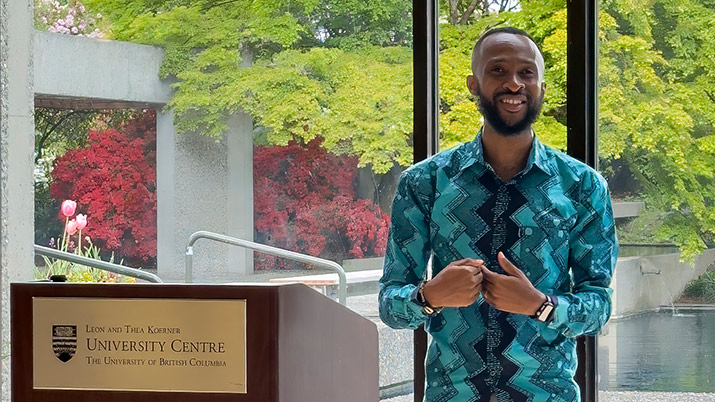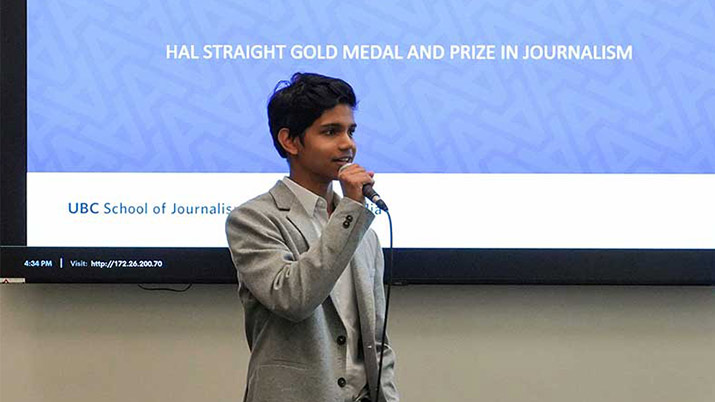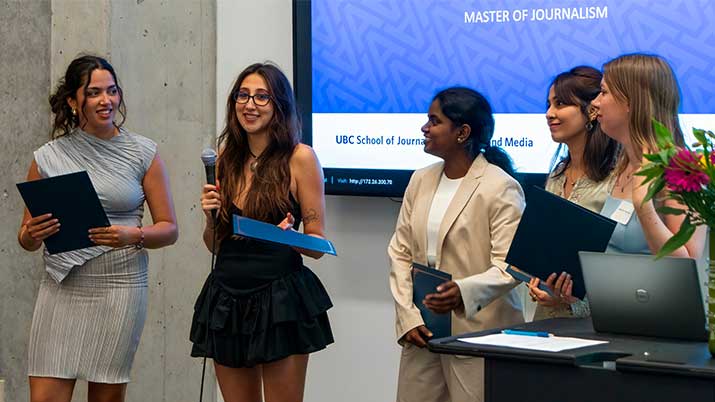Masa Kanan graduated from UBC Journalism in 2018 and now works as a researcher at the political affairs directorate for The Royal Hashemite Court in Jordan.
During her time at the School, Kanan was interested in interviewing, documentary filmmaking and produced several feature articles, including a story on Syrian women trying to rebuild their lives after seeking refuge in Vancouver.
Here’s what she had to say.
Why did you decide to pursue journalism?

I had a bachelor’s degree in political science with a minor in law and society from UBC. Having that knowledge was great but you also need skills to excel in the field of research and analysis. So I wanted to do a master’s degree that would complement my bachelor’s degree and I wanted to do that in UBC. When I moved from Jordan to Vancouver, UBC had become like my home because we would spend so much time on campus. It’s also the place where I made so many friends and met professors who stick with you for a lifetime. The best thing about the university is they give you so many opportunities, while you’re studying there and even after you graduate and the skills you accumulate there prepare you so well for the real world.
On a personal level, I chose journalism because my family comes from a long history of journalism and media. My grandparents were directors and producers, my mom was a news reporter and anchor, and so this felt like the best way to combine two worlds that I like the most. My mother is a great anchor and reporter to look up to. She was the support system I needed to get through the struggles and embrace the good during my time at UBC and my dad taught me that nothing is impossible and that there is nothing in this world that is out of reach. My sister currently studies at the School too! And most importantly, my grandmother is the reason for most of my choices. She was a professor at University of Petra, Jordan and held a PhD in media psychology. She is my guiding light and inspiration to this date. Also, I’m extremely lucky to have a supportive family who motivate me on a daily basis.
What are some of your highlights from the School?
In our first year, during IJ (Integrated Journalism), it was always hard to come up with a pitch. We had so many pitches which we thought were great but they were just ideas. So we all would sit after class hours and discuss and come up with pitches. Over time, it became easier and we became good at pitching. The great thing about J-School is that it’s such a close community and has a small group of students, so you get an opportunity to connect more with people. You start learning about their backgrounds, their culture and form great friendships. Some of the friends I made here are much closer than many of the people that I met during bachelor’s, because we spent so much time together, either working on assignments together or in general, after classes. I also remember spending a lot of time in the study lounge of our building—all of us loved being in there!
Tell us a bit about a story you worked on during your time here that has stuck with you.
For our filming class (Visual Journalism), we had a group project in which we covered a group of Syrian refugee women who have been contributing to their households’ incomes by putting together a series of dinner pop-ups under the name “Tayybeh” across Vancouver. We were invited to shoot during one of their pop-up dinners and I was the only Arabic speaking member of our group. I interviewed the head chef, who shared why they started this venture and how it’s helping them connect with a new culture, a new population and in a new country. And then she told me how she missed a certain family member who was left behind and broke down on camera. In such a situation, you can’t help but feel that emotion. It feels like it is your mom, especially since we shared that middle eastern background. But through the skills I had acquired from the program, I redirected the conversation and told her things that I love about Vancouver. And everything that Vancouver and Canada provided me as a student and as someone young looking for opportunities. Because when my family and I moved to Canada, we grew to fall in love with Canada as much as we love Jordan. We are lucky to have more than one home! So working on this story helped me reconnect with the Middle Eastern community and gave me a chance to help them in some way. And that’s the thing about journalism—depending on the kind of piece you’re working on, it allows you to bring in a humanitarian aspect into the story because sometimes you have a voice but you don’t have the mechanism to voice it. Working on this story felt like I was doing something right.
How has J-School helped you post graduation?
Things I learnt during my bachelor’s and master’s degree at UBC really helped me in all my jobs. I went through a bunch of fields before joining my current job because I never wanted to ask myself later in life “what if I had taken that chance”. I interned and later worked at the United Nations World Food Programme in Jordan, where my role included going to refugee camps and interacting with the people there. As part of the master’s program, I interned at the Roundhouse Radio Vancouver, then at Al-Arabiya in Dubai and later went on to work for them. I worked in NGOs like Save the Children where my job was mainly media advocacy and campaigning. I had to incorporate all the skills that I learnt such as filming videos, editing, writing articles, reports and producing content for them. I also worked at the Immigrant Services Society of BC in Vancouver. Currently, I’m a researcher at the political affairs directorate for the Royal Hashemite Court. My work is particularly in foreign affairs, which requires keeping up with shifting regional and international dynamics, and constantly utilizing my research and analytical skills.
What advice would you leave young journalists?
Sometimes it’s better to listen than to speak. You may not take it seriously now but when you look back, you’ll realize that every sentence which Kathryn (Gretsinger) or Dan (McKinney) spoke came from a place of experience. Also, do not compete. The thing about J-School is there’s a lot of competition and it’s good to have healthy competition but it can also be nerve-wracking for some people. So do the best that you can because there’s always an element out there in this world that you are always better at. Have faith and believe in yourself. Just remember that even though life may seem hard, there’s no obstacle that doesn’t have a solution. And finally, do what you love!


